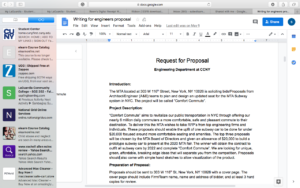Sameer’s DR#8

She was caught by husband in memory chip!

Hypothetical happiness!

Tuesdays 5:00-6:15pm | North Academic Center Library 1/301Y jriceevans@ccny.cuny.edu | (646) 801-1462

She was caught by husband in memory chip!

Hypothetical happiness!
For our project in group #3, we’ve revised and edited the original planning of Leonce’s Architecture to address all concerns pertaining to how we can construct infrastructure to maintain a safe environment whilst ensuring long term sustainability. We went about by spittling the workload between the group. I was the contractor of the group and addressed all concerns of costs and price deficits with my group members. Personally, I loved working on this project and I felt like we nailed every bullet point required to maintain a sustainable infrastructure according to modern state laws of protection and construction. I am giving every member in my group a 97 for not only the work but effort as well. I am giving myself a 97 as well. I felt as if we were able to write our points very well but we couldn’t address all concerns to the audience. Overall, it was a fun project!!
Black Mirror Season 3 Episode 1: Nosedive
The episode of Black Mirror “Nosedive” is set in a world where everyone is connected to their phones and they rate each other from one to five stars for every interaction they have, which can impact their socio-economic status.
The main character is a young woman named Lacie who is consumed by her ratings. She gets an opportunity to make her ratings skyrocket by being the popular childhood friend’s maid of honor for her wedding. Her obsession leads to several mishaps and causes rapid decrease in her ratings. In this world you need a high rating if you want to buy the nicest houses or the nicest cars which is almost like having good credit. Even something as human as accepting coffee from anyone who is below a 3 could bring down your own rating.
I really enjoyed watching this episode because it makes you take a step back and realize how obsessed our generation really is with technology, our phones and social media. This episode teaches you that we should not always care what people think about us or how they perceive us. We should let loose and scream a little sometimes. Which is exactly what Lacie does toward the end of this episode. Once Lacie arrives at the wedding she sneaks in and manages to say a speech, but she becomes extremely upset to the point everyone negatively rates her and security comes and arrests her. She is taken to prison; the rating system is removed from her eyes and they placed Lacie in a cell. She gets into an argument with a man in a separate cell who’s in the same position as her, and both realize how liberating it is to speak your mind without worrying about being rated.

Emotional Speech and Reality

How they perceive us!
“The Offspring” From Star Trek
Artificial intelligence and artificial life have long been a controversial topic among scientists, psychologists, and many others who study human life and development. The main issue is differentiating artificial life from natural life, particularly in the case of human beings. Regarding artificial life, we often come to the dilemma of where artificial life ends, and where natural life begins. If something is sentient is it alive? Is a robot that can effectively communicate with a human being alive? Or are there other factors?
“The offspring” is the name of the star trek the next generation episode, in which Data, an android aboard the enterprise, creates an artificial being. Data created the offspring and programmed it with the ability to act almost human, much like Data. Data also considered the creation to be his child, and when confronted about it he claimed that he had as much right to “procreate” as the human members of the enterprise did.
Data creates his offspring in the belief that if any the members of the crew had decided to have a child, they would likely have not been met with any opposition. When confronted about the creation of his “child” he claims that once he had been accepted as a sentient member of the crew, he had also gained the right to “procreate,” however since he cannot procreate in the fashion that humans can, he just created his own child in the fashion that he could.
Lal is interrogated by Haftel later in the episode. During this interrogation scene, she begins to showcase more of her ability to have emotions. She expresses a strong desire to stay on the enterprise with Data, whom she calls her father, and the rest of the crew whom she is friends with. Although Haftel is too close minded to accept that a robot can display these kinds of emotions, it is very evident that Lal is capable of feelings. This is confirmed in the scene directly after when Lal visits Troi in his room after being interrogated. A clearly confused and distraught Lal is soon overwhelmed by the emotions that she is feeling and returns to Data’s lab. These few scenes in the episode play a role in showing how thin the line between real human emotions and “artificial” emotions can be. If this event were to happen, it would be difficult to argue that Lal would not be able to pass as a human being.
Although humans today have not been able to create a robot as sophisticated as Lal, it is only a matter of time before technology catches up to the imaginations of human beings. When it does, the philosophical line between artificial life and real life will become blurred. It will be impossible to break the scientific barrier as robots will probably never be made up of cells, but it will be difficult to look at a robot with these emotional capabilities and not at least regard it as a human being.


Very evident that Lal is capable of feelings!

Project Proposal

portfolio

Digital receipt
Carlton Yuan- Researcher
Roman Cook- Team Leader
Samir Kunwor- Organizer
Sambeg Raj Subedi- Power Point designer
Topic: Better public transportation payment process in NYC
Propose Idea
Collaborate possibilities
Pick best way to move ahead economically and feasibly
Create and propose idea with Power Point